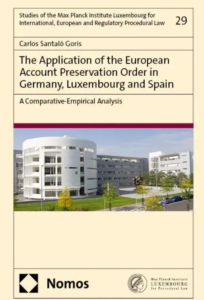Views
Looking but not Seeing the Economic Unit in Cartel Damage Claims – Opinion of Advocate General in Case C-425/22, MOL Magyar Olaj- és Gázipari Nyrt. v Mercedes-Benz Group AG
By Professor András Osztovits*
I. Introduction
The heart of European economic integration is the Single Market, which can only function properly and provide economic growth and thus social welfare if effective competition rules ensure a level playing field for market players. The real breakthrough in the development of EU competition policy in this area came with Regulation 1/2003/EC, and then with Directive 2014/104/EU which complemented the public law rules with private law instruments and made the possibility to bring actions for damages for infringement of competition law easier.
„El clásico“ of Recognition and Enforcement – A Manifest Breach of Freedom of Expression as a Public Policy Violation: Thoughts on AG Szpunar 8.2.2024 – Opinion C-633/22, ECLI:EU:C:2024:127 – Real Madrid Club de Fútbol
By Madeleine Petersen Weiner, Research Fellow and Doctoral Candidate at Heidelberg University
Introduction
On 8 February 2024, Advocate General (AG) Szpunar delivered his Opinion on C-633/22 (AG Opinion), submitting that disproportionate damages for reputational harm may go against the freedom of expression as enshrined in Art. 11 Charter of Fundamental Rights of the European Union (CFR). The enforcement of these damages therefore may (and at times will) constitute a violation of public policy in the enforcing state within the meaning of Art. 34 Nr. 1 Brussels I Regulation. The AG places particular emphasis on the severe deterring effect these sums of damages may have – not only on the defendant newspaper and journalist in the case at hand but other media outlets in general (AG Opinion, paras. 161-171). The decision of the Court of Justice of the European Union (CJEU) will be of particular topical interest not least in light of the EU’s efforts to combat so-called “Strategic Lawsuits Against Public Participation” (SLAPPs) within the EU in which typically financially potent plaintiffs initiate unfounded claims for excessive sums of damages against public watchdogs (see COM(2022) 177 final).
Dubai Supreme Court Admits Reciprocity with the UK and Enforces an English Judgment
Introduction:
I have been reporting on this blog some recent cases from the Dubai Supreme Court (DSC) regarding the recognition and enforcement of foreign judgments (see here, here and here). Reading these posts may have given the legitimate impression that the enforcement of foreign judgments in the UAE, and especially in Dubai, is particularly challenging. This post aims to mitigate that perception by shedding light on a very recent case in which the Dubai courts, with the approval of the DSC, ruled in favor of the enforcement of an English judgment. As the comments below indicate, this is probably the very first case in which the DSC has positively ruled in favor of the enforcement of an English judgment by declaring that the judgment in question met all the requirements set out in UAE law, and in particular, the reciprocity requirement.
News
The Conflicts Vineyard: In the Footsteps of Symeonides

It is a real pleasure to share a new essay by Professor Symeon C. Symeonides, written on the occasion of his retirement after fifty remarkable years in the field of conflict of laws. The essay, eloquently titled Reflections from Fifty Years in the Conflicts Vineyard, was presented as part of a symposium held in his honor in May 2024 at Willamette University College of Law, and sponsored by the AALS Section on Conflict of Laws. Read more
CoL.net Virtual Roundtable on the Commission’s Brussels Ia Report
In light of the Commission’s report on the Brussels Ia Regulation (first discussed here by Xandra Kramer), ConflictofLaws.net will be hosting an ad-hoc virtual roundtable
on Tuesday, 8 July 2025, 12pm–1.30pm (CEST).
The conversation will focus on the report published by the Commission on 2 June and its implications for a possible future reform of the Regulation.
The event will feature the following panellists:
Andrew Dickinson
University of Oxford
Stefano Dominelli
University of Genoa
Pietro Franzina
Catholic University of the Sacred Heart, Milan
Thalia Kruger
University of Antwerp
Tobias Lutzi
University of Augsburg
Everyone interested is warmly invited to join via this Zoom link.
Bridging Legal Systems: A Comparative-Empirical Study on the European Account Preservation Order by Dr. Carlos Santaló Goris
 Warmest congratulations to Dr. Carlos Santaló Goris on the publication of his book, The Application of the European Account Preservation Order in Germany, Luxembourg and Spain. A Comparative-Empirical Analysis (Nomos, 2025).
Warmest congratulations to Dr. Carlos Santaló Goris on the publication of his book, The Application of the European Account Preservation Order in Germany, Luxembourg and Spain. A Comparative-Empirical Analysis (Nomos, 2025).
This scholarly work offers a timely and much-needed exploration of the European Account Preservation Order (EAPO), the first cross-border civil interim measure at EU level. Conceived to enable the provisional attachment of debtors’ bank accounts across Member States, the EAPO aspires to procedural uniformity. Yet, as this study so lucidly demonstrates, its application remains deeply embedded in national procedural systems, giving rise to significant divergences and legal complexity.
With admirable clarity, analytical depth, and empirical rigour, Dr. Santaló Goris leads the reader through this intricate legal terrain. By examining, in particular, the operation of the EAPO in three distinct jurisdictions – Germany, Luxembourg, and Spain – his manuscript illustrates the practical challenges posed by procedural fragmentation while offering valuable guidance for navigating the instrument across legal systems.
This manuscript stands out as a thoughtful and impactful contribution to the field of European civil procedure. What distinguishes it most is its remarkable ability to bridge legal theory and judicial practice. Through a combination of comparative analysis, stakeholder perspectives, and data-driven insights, it offers a comprehensive and balanced account of how the European Account Preservation Order operates in practice, making it an indispensable resource for scholars, practitioners, and policymakers alike.
Congratulations, Carlos, on this well-deserved accomplishment!
More information on this book is available here.



